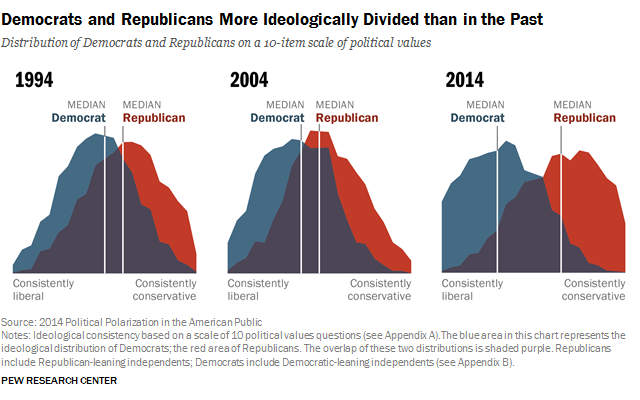
By: Abigail Calandra| Head Editor
October 24, 2019
The current political situation in the United States is a toxic, partisan circus that is threatening the legitimacy of democracy. Government officials, both Democrat and Republican, act like preschoolers accusing one party of betraying the values that our country was built upon. Family dinners are awkward and uncomfortable, to say the least. Politics have become a taboo subject at first dates, family reunions, and parties. The list goes on– but it shouldn’t have to be that way.
While this partisan divide is nothing new, it’s only worsened since the results of Special Counsel Robert Mueller’s investigation of President Donald Trump that neither confirmed nor denied that the Trump Administration cooperated with the Russians during the 2016 Presidential Election.
Although Mueller clearly stated that the president was not exonerated, 68 percent of registered Republicans believe that the investigation proved that the president was cleared of his crimes, whereas only eight percent of Democrats agree. It’s gotten to the point where even completely rational people won’t admit that Trump suffers from a special kind of lunacy because he’s “their guy.” But the Democrats aren’t much better either, they look for any reason to impeach Trump, and it’s starting to look like a coup. Trump thrives off of this partisan energy and it’s dangerous—but he’s not the cause of it.
From the 1960s to now, the two political parties have been distinctly divided by ideological, racial, religious, and geographic differences. The Republican party is predominantly white, Christian, rural, and some-what more male. The democratic party is pretty much everyone else. As the United States becomes more socially diverse and the partisan divide increases, it becomes a lot easier to dehumanize the other side; we therefore begin to view them as enemies rather than opponents.
“I believe that the whole purpose of a two party system is to facilitate a compromise that will benefit the greatest amount of people possible,” San Clemente High School senior Caleb Mettler said. “The word compromise implies that each side has to sacrifice something in order to gain something, in our current polarized political state neither side is willing to accept meeting in the middle. The right and left are so desperate to achieve their own goals that they have effectively disabled a democratic system designed for compromise.”
One of the best places to witness the partisan divide is in North Carolina. The state has been in a toxic state of partisan conflict for decades, and it has only worsened since Republicans seized legislation in 2010. The 2020 Republican convention will be held in North Carolina which undermines its importance of a state to win. In 2008 Barack Obama carried North Carolina by the smallest margin of the states he won and in 2012 Mitt Romney won the state also by the smallest margin.
Trump won North Carolina by three-and-a-half points in 2016, partially as a rebuttal to the Obama presidency. In 2007, whites in the US were equally likely to identify as Democrats as they were Republicans; however, as of 2016, 15 percent more whites identify as Republicans—signifying that race is a defining characteristic of political polarization.

“I think that one cause of this divide is the echo chambers that both liberals and conservatives have created for themselves,” senior Kate McKernan said. “If we only hear our own perspectives parroted back to us by both the people we surround ourselves with and in the media we consume, it’s really easy to fully invest in that one ideology while demonizing the other side.”
North Carolina’s political polarization can be traced back to the civil rights movement in the 1960s, beginning after four African- American college students sat down at a white-only lunch counter in Greensboro. Following the famous sit-in, moderate Democrats helped create legislation to pass the Civil Rights Act of 1964 and 1965. The support from these liberal Democrats caused the conservative Democrats to migrate towards the Republican party. This happened across the south as voters began to endorse their support for candidates such as Richard Nixon, Ronald Reagan, or Donald Trump.
The Republican party is not solely to blame for increased political tensions, many Democrats associate anyone that supports Donald Trump with being a racist. It also must be taken into consideration that the Republican party is affiliated with systems that systematically oppress non-white groups. Not everyone that makes up the party are racist, the party’s just uninterested in addressing systemic racism, which is just as bad. In 2016, white voters without a college degree shifted towards Trump as political tensions increased due to the belief that white Americans will become a minority within the next 30 years. This has caused many white Americans to feel threatened, subsequently attempting to “rig the system” with legislation such as the new voter ID law and gerrymandered electoral districts. However, in 2016, the National Association for the Advancement of Colored People took the new voter ID law to the federal appeals court, which the judges shut down because it was designed to “target African-Americans with almost surgical precision.” This past December the Republican party passed another voter ID law and the NAACP is back in action, challenging it in court again.
It’s clear the polarization of American politics is rooted in race and identity. This is not a regional, north versus south issue like in 1850. This is nation-wide and potentially dangerous. Politics are not defined by red and blue, rather by morals and beliefs, it’s time that we realize it.

Leave a Reply